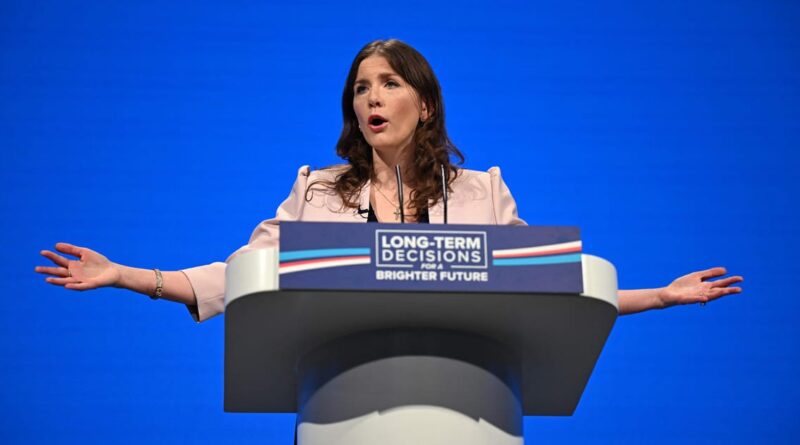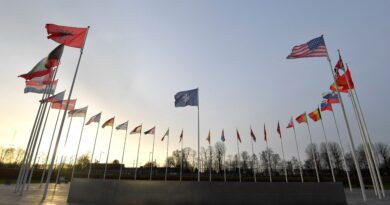From WWE wrestling to global AI summit: The unlikely rise of Michelle Donelan
LONDON — Britain’s tech chief is no stranger to dealing with big egos. She used to promote superstar wrestlers.
U.K. Science and Technology Secretary Michelle Donelan’s past career as a marketeer for WWE wrestling may stand her in good stead at Bletchley Park on Wednesday, as she hosts representatives from more than 100 tech companies, countries and academic institutions on the first day of a U.K.-hosted summit which aims to grapple with one of the biggest challenges of our time — the rise of artificial intelligence.
Working at the fast-paced WWE was “very much like” being at her busy Department for Science, Innovation and Technology (DSIT), Donelan tells POLITICO — somewhat improbably — in an eve-of-summit interview at her sparsely-decorated office on Whitehall.
The oddball world of commercial wrestling was also good training for politics.
“It was an eye-opener to different personalities, and how to deal with those different personalities,” she says — ideal for “dealing with big egos, in terms of British politics.”
A low-profile Tory MP who only bagged her first junior ministerial job in 2019, Donelan makes for a surprising compère for the first day of Rishi Sunak’s much-hyped AI summit.
Unlike Sunak, the 39-year-old was no self-professed tech geek when she was entrusted with setting up his new science and technology department in February 2023. By her own admission she doesn’t regularly use generative AI tools like ChatGPT.
But Donelan, who was pregnant with her first child when she was handed the science and tech brief, has been wading through piles of binders detailing technical information as she tries to get to grips with the subject. Colleagues note admiringly (and sometimes despairingly) how she operates on just a few hours sleep.
“I think my journey on this has been a deeper understanding of … just how vital it is that we do lead in this, that we aren’t passive, that we don’t wait for others,” she says.
Summit going on
Since February, Donelan has been laying the groundwork for a summit Sunak hopes will be one of the defining moments of his premiership, with the objective of convincing world leaders to agree on the risks posed by AI.
She, like the PM, is concerned about the potential disruption artificial intelligence could pose. “The risks are very daunting, there’s no denying that,” she says, while acknowledging “there is a debate about whether they will materialize or not.”
Her critics say the summit is wrongly focused on long-term risk, however, and argue not enough is being done to tackle AI’s more immediate threats.
The U.K. is “way behind” in terms of bringing forward actual legislation, said Peter Kyle, Donelan’s opposite number in the Labour Party, who has not been invited to this week’s summit. Donelan’s department has not yet even published a response to its own consultation on an artificial intelligence white paper published way back in March, he pointed out.
Donelan insists the summit is “only part” of the U.K.’s work on artificial intelligence, however and that it plans to say more about the white paper — a first step toward legislation — “by the end of the year.”
“We’re not afraid to legislate. There will have to be legislation in this space eventually,” she says.
But specifics are thin on the ground. She refuses to be drawn on “arbitrary timelines.”
Surviving the hospital pass
It was Donelan’s embrace of the government’s controversial Online Safety Bill, which she inherited in her previous ministerial role during the short-lived premiership of Liz Truss, which attracted the attention of Sunak.
In the hard-fought Tory leadership campaign of July and August 2022, Truss and Sunak both promised to scrap parts of the bill focused on policing “legal but harmful” online content. It was Donelan, appointed as culture secretary by Truss, who was left to unravel those pledges.
Her “no-nonsense” and “methodical” approach to the bill, and her willingness to take the views of her MP colleagues seriously, impressed Sunak when he arrived in No. 10 following Truss’ self-destruction.
For that reason he kept her in post — and then chose her to set up the new department for science and technology earlier this year, according to a No. 10 official closely involved with that decision, granted anonymity to discuss internal government business.
“I think Rishi, like me, can see that she is one of those effective secretaries of state that will deliver outcomes,” said former Education Secretary Nadhim Zahawi, whom Donelan worked alongside prior to her promotion to Cabinet.
Finally getting the Online Safety Bill into law was a notable achievement. Donelan’s previous claim to fame had been her unwanted record of being the shortest-serving Cabinet minister in British history. She took the job of education secretary, and then resigned 35 hours later, in the chaotic final days of the Boris Johnson administration.
Child protection
Donelan’s resolve to get the bill through parliament had been hardened by a one-to-one meeting with campaigner Ian Russell last November. His daughter Molly took her own life after viewing suicide content online.
Donelan has kept the dossier of Molly’s posts handed to her by Russell at that private meeting, according to one U.K. government official. “From that [meeting] she was more determined to do something on child protection,” they said.
“It was heart-wrenching to hear his story, and those of other bereaved parents and I felt very passionately that we had an opportunity to really make a difference on this and to and to change the nature in which we regulate the online world,” Donelan says.
Her approach was strikingly different to the long line of Tory ministers who preceded her. Her willingness to simply pick up the phone to relevant business leaders — often bypassing official government channels — has won her admirers in the exasperated U.K. tech industry, which has endured a succession of different ministers overseeing a bill plagued by uncertainty.
“It was a complete breath of fresh air when she came in,” said Dom Hallas, executive director of tech lobbying outfit the Startup Coalition. “At industry roundtables she is to the point and well-briefed, but she is also frank when something is not going to happen.”
“She actually gets things done, which I would contrast with the previous [Boris Johnson-led] regime. She does listen and seems interested in trying to find out what various stakeholders think about things,” Julian David, chief executive of industry body TechUK, added.
Donelan feels she has skin in the game. Her son was born in the spring, and the tech secretary says the new online laws make her “a lot more confident in his use of social media, when he’s old enough.”
Donelan confirms, however, that being handed a new government department, while heavily pregnant, and about to take maternity leave, was no small challenge.
“I’m not going to lie. It’s a lot harder than I thought it was going to be. Before you have a child you don’t appreciate you are going to have things like ‘Mum guilt’,” she says. “It was easier in my head and harder in reality.”
The long game
Donelan’s unshowy style belies a burning ambition, according to multiple MPs and officials who have tracked her career to date.
She told both the Mail on Sunday and the BBC’s Political Thinking podcast that she decided to become a politician at the age of six, after seeing Tory icon Margaret Thatcher on television.
In 1999, aged just 15, she spoke at the Conservative Party Conference in Blackpool. She was just 26 when she first stood for election, as a no-hoper in the safe Labour seat of Wentworth and Dearne in 2010.
Three years later she became the Conservative candidate for the Lib Dem held seat of Chippenham — going on to overturn a 2,470 Lib Dem majority in the 2015 general election.
On arriving in parliament, Donelan’s ambition was obvious to colleagues. One recalls her immediately asking for advice on how to climb the career ladder.
Soon after she took her first step up, as a parliamentary private secretary — a lowly unpaid aide to a minister — the Conservative whips’ office created a leaderboard tallying the workrate of the 40-odd MPs holding similar roles. Donelan led the way, smashing every target by a significant margin, one minister said.
“If she’s given a task she will attack it like nothing else. I’m not so sure about the bigger picture stuff — wider strategizing and setting a direction herself. But give her a direction and she’ll go at it,” the same minister said.
In her private life, Donelan is a committed Christian who shies away from the darker side of politics. She is “extremely respectful of Cabinet colleagues,” another former government official who worked with her said. “She doesn’t seem to be involved in backdoor skulduggery. It is all very earnest, but it is working for her in a way that is quite refreshing.”
Yet she raised eyebrows at the Conservative Party conference in October with a main stage speech clearly designed to please the grassroots and capture a few right-wing headlines. Donelan vowed a crackdown on the “creeping wokeism” she claimed is threatening scientific research — and went viral for all the wrong reasons.
A difficult interview with the BBC’s Victoria Derbyshire at the same conference also landed her less-than-positive headlines.
For an ambitious minister looking to wrestle her way onto the world stage this week, these are nothing more than hazards of the job.
Emilio Casalicchio contributed reporting


